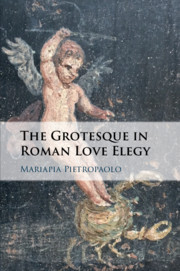Book contents
- The Grotesque in Roman Love Elegy
- The Grotesque in Roman Love Elegy
- Copyright page
- Dedication
- Contents
- Preface
- Acknowledgements
- Abbreviations
- Chapter 1 Premises and Expectations of the Elegiac Grotesque
- Chapter 2 Context and Prehistory of the Elegiac Grotesque
- Chapter 3 Cynthia and the Grotesque Ethos
- Chapter 4 The Ovidian Unmasking of the Elegiac Grotesque
- Chapter 5 Revolting and Refined: The Aesthetic Function of Acanthis
- Chapter 6 Grotesque Hermeneutics of the Lena in Tibullus and Ovid
- Chapter 7 The Rival: A Vir Foedus
- Chapter 8 Pasiphae and the Allurement of the Grotesque
- Chapter 9 Ovid’s Remedia and the Waning of the Elegiac Grotesque
- References
- Index
Chapter 8 - Pasiphae and the Allurement of the Grotesque
Published online by Cambridge University Press: 10 September 2020
- The Grotesque in Roman Love Elegy
- The Grotesque in Roman Love Elegy
- Copyright page
- Dedication
- Contents
- Preface
- Acknowledgements
- Abbreviations
- Chapter 1 Premises and Expectations of the Elegiac Grotesque
- Chapter 2 Context and Prehistory of the Elegiac Grotesque
- Chapter 3 Cynthia and the Grotesque Ethos
- Chapter 4 The Ovidian Unmasking of the Elegiac Grotesque
- Chapter 5 Revolting and Refined: The Aesthetic Function of Acanthis
- Chapter 6 Grotesque Hermeneutics of the Lena in Tibullus and Ovid
- Chapter 7 The Rival: A Vir Foedus
- Chapter 8 Pasiphae and the Allurement of the Grotesque
- Chapter 9 Ovid’s Remedia and the Waning of the Elegiac Grotesque
- References
- Index
Summary
In the mythological account inherited by Ovid, Pasiphae went through a psychological transformation in which she was assailed by the grotesque desire to be mated by a bull. She thereby lowered the human character of her sexuality to that of an animal. When Ovid imports her story into the domain of elegy, her degradation runs counter to the genre’s conventional idealization of sexual life. Yet Ovid’s Pasiphae lives out that craving as if propelled by the rhetoric of elegy. She is a queen pursuing a beloved in a georgic landscape, but she behaves like a composite of the elegiac puella and the elegiac lover. Pasiphae thereby brings her grotesque psychology into the imaginative world of elegy, cultivating her dark desire under its mannerisms, until she manages to have sex with the bull. The elegiac echoes of her role in the erotic scenario, the meter in which it is outlined, and the elegiac allusions in its images – these all shift the ground of the reading experience from the mythical horror of aberrant sexuality to the realm of the elegiac grotesque, in which nefarious eroticism and elegiac love conventions are fused, appearing at once monstrous, contemptuous, and ridiculous.
- Type
- Chapter
- Information
- The Grotesque in Roman Love Elegy , pp. 178 - 198Publisher: Cambridge University PressPrint publication year: 2020

